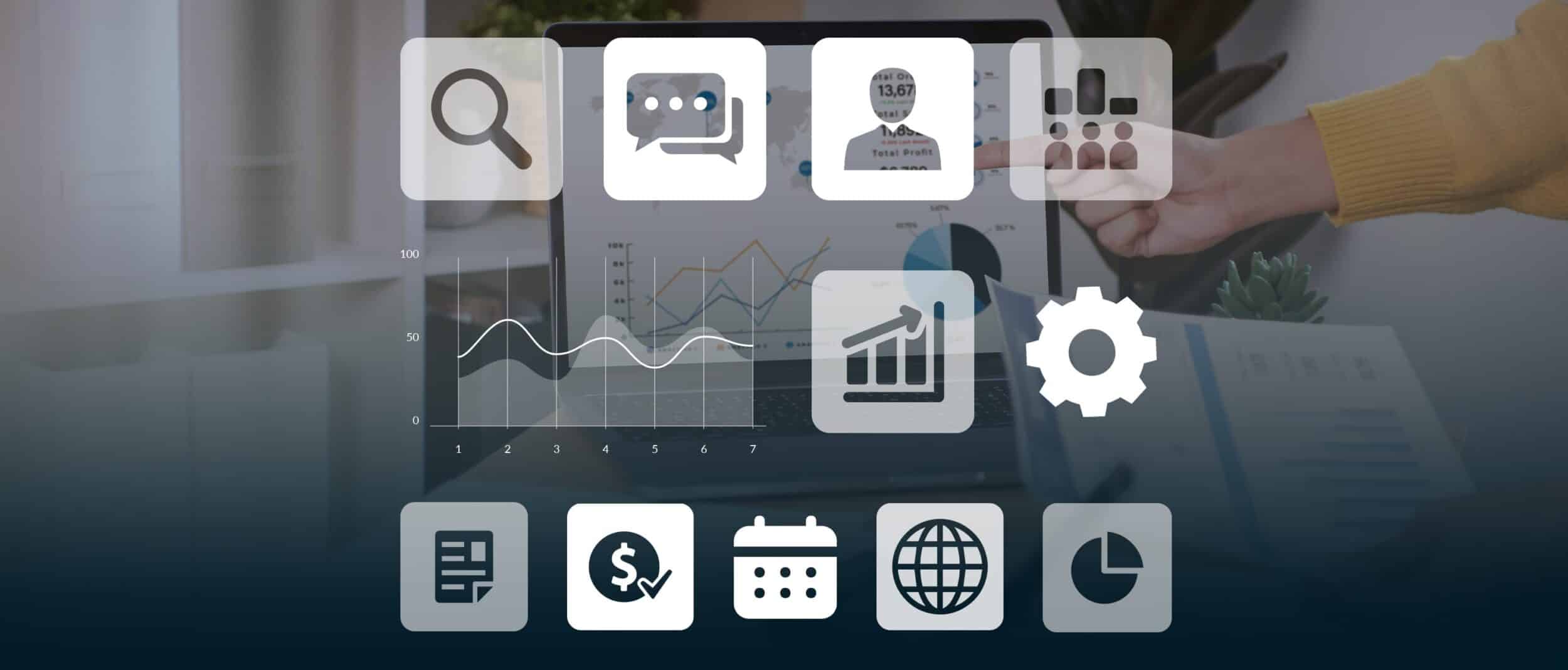Accounting is one of the key areas where automation technology is highly beneficial. No wonder technology literacy has become the top skill accountants require today. Digital advancements drive the expansion of the global accounting services market, making more companies realize the possibilities of accounting software in the workplace.
According to projections, the market for accounting software will increase at a CAGR of 19.6% by 2030, reaching $70.2 billion. Custom accounting software provides many advantages, including tax compliance, cash flow analysis, balance sheets, invoicing, income and expenses statements, and payroll. Process automation also saves time and money and minimizes errors, opening up potential growth opportunities for the market.
This article will explain why build custom accounting software, discuss its must-have features, step-by-step development process, and estimated costs. We will share Inoxoft's experience in custom accounting software development and software integration services by reviewing the case study of instant image processing app development for online accounting.
- Why Build Your Own Accounting Software
- Straightforward information retrieval
- Reducing costs
- Saving time through automation
- Minimizing human error
- Enhancing financial statement coverage
- Must-Have Features of Custom Accounting Software
- VAT calculations
- Payroll management
- Reports
- Invoice processing
- E-payments
- Multiple access levels
- Integration with other systems
- Expenses tracking
- Bank account linking
- Graphics
- 4 Steps of the Accounting Software Development Process
- In-depth research and estimation
- Design and prototyping
- Hosting and software development
- Launching and maintenance
- Factors that Influence Accounting Software Development Cost and Timelines
- The Number and Complexity of Features
- Hourly rates of your development team members
- The number of members in the team
- Tips for Optimization while Developing Accounting Software
- Prioritize must-have functionality
- Outsource to Eastern Europe
- Consider Inoxoft Your Trusted Partner
- Instant image processing for online accounting
- Ace Your Custom Accounting Software Development with Inoxoft
Why Build Your Own Accounting Software
Accounting software is a computer program that maintains accounting books on-premises or in the cloud, including records of transactions and account balances. Some ready-made solutions are available. Yet, they have fixed features that customers cannot alter or customize. Therefore, incorporating a SaaS solution might be not the best option for a large business.
Unlike off-the-shelf solutions, custom development of an accounting software can benefit various companies in several ways. They are customized to meet your needs and consider your business objectives and workflow. You can scale custom software and control the security of your and your client’s data without any third parties.
Using and overseeing custom web-based accounting systems has the following benefits: enhancing your income statement, cash flow reporting, asset inventory management, and streamlining your financial processes.
Straightforward information retrieval
Since overall accounting is the origin of all financial data, employing customized accounting systems makes it simple to relate any future data. Custom online accounting software helps prevent scenarios when the company cannot locate the required data. Furthermore, it eliminates the necessity for conventional paper-based procedures.
Reducing costs
Businesses can dramatically lower their accounting costs by using custom web-based accounting software. Such systems can reduce paperwork and financial processing costs, increasing document processing and reconciliation efficiency. A unified accounting business software solution allows for better organization and eliminates the issue of being overrun by a flow of information from several businesses.
Saving time through automation
This essential benefit results from embracing automation, boosting internal efficiency and encouraging more exact timings. Automation of accounting software saves time. Accounting software developers must stay on track with emerging technologies to increase your company’s effectiveness. It will keep you one step ahead of the competition and use technological advancements to their full potential.
Minimizing human error
Although you’ll need a team of tech experts to set up your accounting management system, very little specialized knowledge is necessary to maintain it efficiently. The best-case scenario for your accounting software development project is that the system will be able to completely eliminate or, at least, greatly minimize the likelihood of error-related losses for your business. For example, full-service in-house accounting software development can significantly increase calculation accuracy.
Enhancing financial statement coverage
A custom accounting system can cover financial statements more accurately with the help of static and graphical data sources. Users of a visual accounting system can work together to achieve shared financial objectives at a higher level of productivity. Custom accounting software gives users access to more information and the power to manage the data flow.
Must-Have Features of Custom Accounting Software
Before compiling the list of features for your custom accounting software, you will need to conduct research, establish your target market and goals, determine your budget, and request quotes from potential vendors. First, let’s look at the basic features of your accounting solution.
VAT calculations
Your accounting program should process data, calculate VAT payments, and gather reports at the end of each tax period. This feature helps accountants avoid mistakes and saves time.
Payroll management
You may keep track of the money you spend on employees and manage the regular salaries for each employee using payroll processing functionality. Accountants can enter the necessary wage for each employee per day and month. The software will assist in calculating the entire compensation, including bonuses and taxes, for the specified time.
Reports
Your employees must gather and deliver reports to tax services monthly, weekly, and annually. You can create an accounting software to automatically generate these reports without involving employees. This feature will enhance your company’s financial operations while assisting accountants in faster processing and sending information to tax services.
Invoice processing
Processing invoices typically require the attention of several employees. It will be a lot simpler with high-quality custom accounting software. In addition, your business can boost client communication with the help of invoice processing. Names, addresses, and other private information about your clients can be stored with this feature.
E-payments
Today, a lot of people choose to make payments online. Therefore, your accounting software has to include an online payment option. In addition, customers can spend money directly from their bank accounts thanks to digital payments.
Multiple access levels
Data security is crucial, particularly regarding confidential information and financial records. The most popular method of data protection is using multiple access levels. Usually, software engineers create different access levels for admins, accountants, and managers. Assigning permissions based on an employee’s position is an excellent tool for large organizations with hundreds or thousands of people.
Integration with other systems
Large companies use many platforms simultaneously. Your software needs to be able to interact with other systems to allow your business to grow in the future. Accounting solutions should be compatible with e-commerce, banking, and e-filing systems to simplify accountants’ workflow. The financial process will run more smoothly thanks to these integrations.
Expenses tracking
Any accounting system should be able to track different expenses, such as bank payments, receipt reconciliations, etc. To keep everything in one place, your employees should be able to snap and submit images of receipts. Accounting software should enable you to organize your receipts, calculate expenses based on recurring payments, and more.
Bank account linking
For convenience, automation, and accuracy, you must be able to connect your bank accounts to your accounting software. The most popular file types used by banks and fintech platforms, such as OFX, QIF, and CSV, should be supported by your program for uploading electronic statements.
Graphics
Accounting professionals and managers can better visualize data by seeing a structured report in a single chart or other graph types. Illustrations can highlight the critical points in the reports. Moreover, viewing reports in pie charts makes it simpler to compare them.
4 Steps of the Accounting Software Development Process
How to make an accounting software? It takes time to create software that functions well for a client. The client’s needs and the required features determine any software development process’s duration. Usually, developers single out the following stages of accounting software development.
In-depth research and estimation
It’s a good idea to research and determine the general cost of developing accounting software before hiring a development team. You can contact a development company with relevant experience to get an estimated budget for your custom accounting software development.
An experienced vendor must begin your custom accounting software development with a thorough study to address your company’s issues and difficulties. At this point, you need to provide an accounting software development company with a detailed explanation of your goals and priorities.
Before building an accounting software, the project team should concentrate on your approach, business problems, and obstacles. It is also necessary to include the typical solution roadmap and alternatives, your company’s present demands and goals, market and accounting software design trends, and plans and goals.
Design and prototyping
When you have the project’s estimation, it’s time to start creating wireframes and prototypes. First, the development team will build a framework that includes the software’s essential features and ensure each component works with the others. The user interface will then be enhanced, adding more functions.
At this point, you can comment on the project and suggest what features to add and delete. Once the prototype and the proposed design get approved, it’s time to proceed to the most crucial stage – software development.
Hosting and software development
At this stage, it’s time to decide where to host your custom accounting software.
- On-premises software. It is a common but quite expensive solution that is challenging to upgrade. Moreover, they risk exposing unsecured databases more than cloud-based alternatives.
- Web-based solutions. Web hosts offer other businesses access to space on a server they own or rent. Compared to software hosted on-premises, they offer clients more flexibility because they can be configured flexibly and updated more frequently.
- Cloud hosting. Small organizations with few or no on-premises environments can decide to build a cloud-based accounting software. SaaS accounting software allows small businesses to run accounting programs with significantly higher scalability and flexibility.
After selecting a hosting type, accounting software coding can proceed. The team creates the code, runs tests, and makes the application ready for publication to the public. Programming and quality assurance may occur concurrently following modern software development best practices. The software is instantly tested in every little detail. Doing this will lessen software defects’ frequency, streamline the development procedure, and save money.
Launching and maintenance
After custom accounting software development, the system is deployed and prepared for usage. The work is still ongoing, though. For the software to remain current, it has to be monitored and updated. Because of this, accounting software requires a support and maintenance team. This team will address problems or unforeseen crashes and deal with weak points.
Factors that Influence Accounting Software Development Cost and Timelines
How to develop accounting software without knowing a project budget and timelines? You need to know how must time and money it will take to build your accounting solution. Your software’s cost and timelines will vary depending on several variables:
- The number and complexity of features
- Hourly rates of your development team members
- The number of members of the team
The Number and Complexity of Features
The more complex your custom account software is, the more time and resources it will take to develop it. A budget for a humble project with basic functionality can vary from $20,000 to $30,000. However, if you own a mid-to-large organization and require unique and complex features, the cost will be significantly higher, ranging from $60,000 to $100,000 or more.
Hourly rates of your development team members
You’ll need the following team members to design accounting software successfully: a backend developer, front-end developer, UI/UX designer, QA engineer, business analyst, project manager, and team lead. Hourly rates of tech specialists vary greatly depending on the region and their level of expertise. Professional developers typically charge around $50 per hour.
The number of members in the team
The size of your development team significantly impacts both the cost and the timelines of your custom accounting software development. Based on your business goals and budget, you may either opt for a small team to save costs or hire additional tech experts to speed up the development process.
Tips for Optimization while Developing Accounting Software
Developing custom accounting software may be costly and timely. Based on Inoxoft’s experience in how to build accounting software, we would like to share some tips that may help you optimize the spending of money and time on the development of accounting software.
Prioritize must-have functionality
Developing every feature of your accounting software requires the attention of software developers. Before approving the design of your accounting solution, spend some time researching what features are essential for your company. Avoiding developing features that your accounting staff will not use can save your development team’s time, speed up the process, and save your budget.
Outsource to Eastern Europe
The entire development cost will depend on the hourly rate of your vendor because accounting software development typically takes 1500 to 2500 hours. The location of development companies has a major impact on developers’ hourly rates. Without sacrificing quality, a project that would cost $100,000 to develop in the US might be completed for $40,000 in Eastern Europe.
Consider Inoxoft Your Trusted Partner
Inoxoft is an international software development company with robust expertise in custom accounting software development. Our expert team knows how to create accounting software that supports organic business growth. Whether it comes to architectural design, testing, bug fixing, and project execution, our trained software engineers are 100% capable of handling these issues.
Let’s look at our case study demonstrating Inoxoft’s experience in custom accounting software development in detail.
Instant image processing for online accounting
Our client required a mobile application to improve the time and cost-effectiveness of online accounting. They asked Inoxoft to develop an automated invoice calculation approach to make the accounting process self-sufficient.
The Inoxoft engineers created an application that connects the staff to the server-based automated accounting system. Now the employer can access the accounting system to keep tabs on the most current financial situation without engaging an accountant. The app connects the users with the server, allowing the clients to save and calculate all expense-related documents while saving space on the table.
As a result of Inoxoft’s teamwork, the client achieved the following outcomes:
- Quick and straightforward access to a database online.
- UI/UX created per the brand guide.
- Simple download of check and invoice images.
Ace Your Custom Accounting Software Development with Inoxoft
Accounting is one of the fields where automation technology is used more widely than ever as more businesses are becoming aware of the potential of accounting software in the workplace. Creating custom accounting software allows companies to tailor its features to their business needs and workflow, scale seamlessly, and provide more robust security.
Inoxoft has experience in custom accounting software development and integration services. We develop custom accounting software that helps to promote organic business growth. Inoxoft’s team of experts is ready to resolve any of the challenges of accounting software development and customize the solution to your business goals.
Get in touch with us to consult deeper on Inoxoft software integration services.
Frequently Asked Questions
How to build accounting software?
To create your own custom accounting software, you need to complete the following steps: conduct thorough research and estimation, design the prototypes of your future solution, decide on the hosting, and develop, launch, and maintain your accounting software.
What is the cost of accounting software development?
The cost of accounting software development varies greatly depending on several factors, such as the number and complexity of features, the hourly rate of your development team members, and the size of your team. The total cost can range from $20,000 to $100,000 and more.
Is it worth it to create custom accounting software?
Custom accounting software has various advantages for a business of any size. These comprise invoicing, income and expense statements, payroll, and tax compliance. Moreover, process automation reduces errors, saves time and money.









